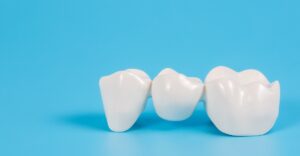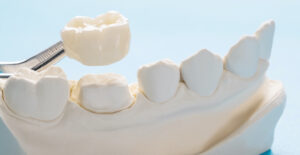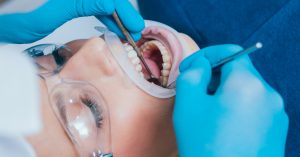Believe it or not, your gums serve a major purpose in your mouth and need caring for just like your teeth. Your gums are the pink tissue surrounding your teeth and without proper care, they can swell up and become inflamed, red, and even feel painful. Gum inflammation can oftentimes be painful and is a warning sign of gum disease. Gum disease is one of the leading causes of tooth loss if left untreated. In fact the CDC has reported that 46% of adults over 30 show signs of gum disease. Here we explore all the ways you can identify if you have swollen gums and the remedies to heal them.
What causes swollen gums?
The most common cause of swollen gums is gum disease, which includes both gingivitis and periodontal disease. Gingivitis is a reversible condition that often is associated with red, swollen, and inflamed gums. It is caused by poor oral hygiene practices. Gingivitis is a milder form of gum disease and can be reversed typically in around two weeks if oral hygiene is improved.
Periodontal disease is the result of untreated gingivitis. This disease can cause bone and tissue loss and is responsible for mobile teeth and also for tooth loss. Periodontal disease is more severe and often requires more timely and costly treatment.
Symptoms of gum disease include:
- Sore, swollen gums
- Gums that bleed when you brush or floss
- Bad breath
- Receding gum line
- Mobile teeth
Other causes of swollen gums if oral hygiene is fair is taking certain medications that can cause bulbous gums like seizure medication, anti-hypertensive medication, and immunosuppression medication.
If oral hygiene or medication is not the cause of your swollen gums, then you may want to speak to your dentist about additional causes. These may include:
- Hormone changes: Hormones changes due to puberty, menstruation, pregnancy, and menopause can cause increased blood flow to the gums leading to more tender and red gingiva.
- Tobacco products: Smoking is bad for your teeth, gums, and entire oral cavity. It puts you at a higher risk for oral cancer. Nicotine in tobacco products can cause inflammation and prevent your gums from healing themselves.
- Cancer treatment: Radiation for cancer treatment causes inflamed gums. Inflammation and sores can occur as a side effect of chemotherapy, typically in the first 5 to 10 days following treatment.
- Abscess or infection: A tooth abscess is when pus and bacteria collect around the tooth leaving a pocket that is swollen and red.
- Orthodontic treatment: Braces are a cause for swollen gums because it causes gums to swell up in response to the “foreign object.” Other times, oral hygiene is more difficult to maintain and leads to gingivitis while wearing braces.
Swollen gums are important to address in case there is an underlying issue like a medication change or a pregnancy granuloma that causes inflammation or tender gums. Untreated swollen gums can cause continual pain, and if severe enough, may lead to gum disease and/or tooth loss.
What is the treatment for swollen gums?
There are a variety of treatments available for swollen gums. You can first try at-home remedies including:
- Brushing and flossing — If you are experiencing swollen and/or bleeding gums, you should brush and floss to treat the problem. This will decrease the inflammation around your teeth.
- Saltwater — Rinsing with a warm saltwater solution has been shown to be an effective way to treat inflamed gums and canker sores because it is anti-inflammatory.
- Compresses — Using warm compresses can reduce gum pain. You can use a cold compress to reduce any gingival swelling.
If this doesn’t work and you feel you need professional treatment, it is time to reach out to your dentist for assistance. The best cure for swollen gums in a dental office often includes a professional cleaning, including a scaling and root planing, antibiotics applied subgingivally, and at times periodontal surgery to remove any subgingival plaque and calculus.
If you have braces and you experience swollen gums, you can get a Waterpik to help clean between your teeth or go for more frequent cleanings. If swollen gums are too severe, your dentist may need to remove a bracket and excise a piece of gum tissue so it does not overgrow your braces.
Swollen gums can be painful and uncomfortable and also cause cosmetic issues. If you care for the way your teeth look and your overall health, it is important to maintain good oral hygiene practices like brushing and flossing. Swollen gums are often caused by poor oral care, but there are additional causes that you may need to speak to your dental professional about. If you can manage your care at home with good brushing and flossing habits, and regular routine visits to your dentist, you are in luck! If not, it is best to always make a dental appointment to get your oral health where it needs to be. Contact us today to learn more!












